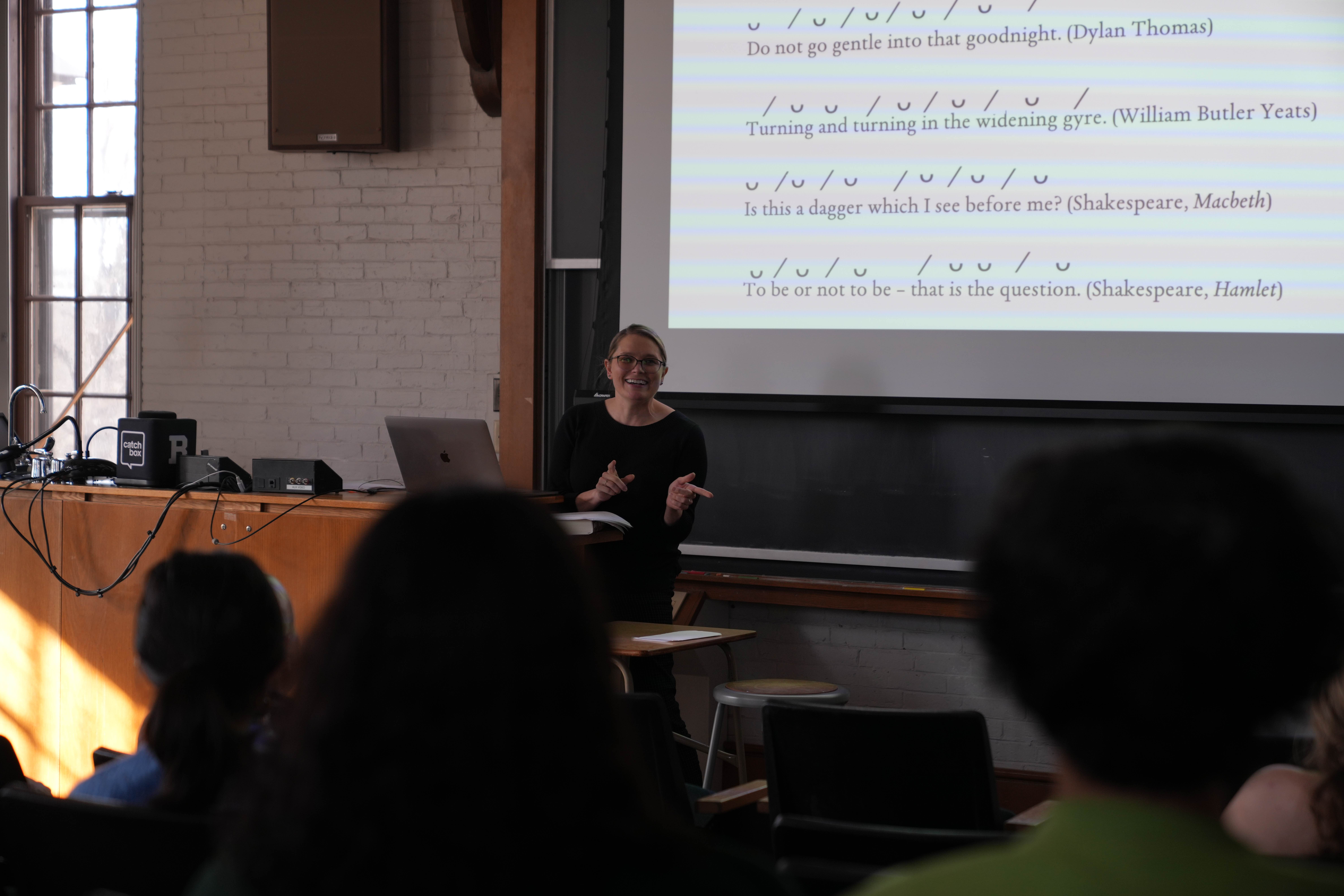Stephanie McCarter discusses her feminist translation of Ovid’s ‘Metamorphoses’
April 14, 2023

Though roughly two millennia and 4000 miles separate present-day Bowdoin from Ovid’s “Metamorphoses,” the text assumed new life on Wednesday evening as Stephanie McCarter, a professor of classical languages at Sewanee: the University of the South, delivered a lecture on her 2022 translation of the Roman epic.
McCarter, whose visit was sponsored by the Department of Classics with support from the Jasper Jacob Stahl Lectureship, described the intricacies of translation in detail, ranging from her decision to adopt iambic pentameter to her interpretation of scenes depicting sexual violence. While McCarter’s translation joins a crowded field of modern, English-language translations of “Metamorphoses,” it is unique in its careful attention to the language used to describe gender and sexual violence—themes that occupy a central position in Ovid’s epic.
“Too often, translators project later cultural baggage onto the past, particularly when it comes to reticence about rape, assumptions about gender and the body and attitudes about sexuality,” McCarter said. “Often these projections result when one introduces ornate, poetic language: ravish for rape, bosoms for chest.”
The consequences of such a translation, McCarter contended, are immense.
“The choices the translator makes can have a huge impact on how the text is understood in these moments,” McCarter said. “If, for instance, the text seems to euphemize or romanticize rape, it might be tempting to identify Ovid or the narrator as unambiguously sympathetic to the perpetrators of such violence. The translation that accurately communicates Ovid’s narrative voice, however, opens up the possibility that the epic itself takes a critical stance towards the violence it contains.”
Illustrating her effort to eschew misogynistic biases in favor of a faithful translation of the original Latin, McCarter highlighted two examples from the text: the story of Neptune’s rape of Caenis and the story of Apollo and Daphne. McCarter elucidated the choices underlying her translation of the passages while comparing her English translation with those of other popular translators. Where McCarter remained close to the Latin in describing Daphne without embellishment, previous translators opted to characterize Daphne as having a “darling little mouth” or “tempting lips”—flourishes that not only stray from the original but also impose a sexualized understanding of Daphne that Ovid himself may have not intended.
Professor of Latin and Greek Barbara Boyd, who invited McCarter and is currently teaching a course on Ovid’s “Metamorphoses,” lauded McCarter’s translation.
“What she has attempted to do in putting together her translation is to interrogate what it is we do when we translate something,” Boyd said. “If you were to go back and look at all the earlier translations of Homer’s poetry, Virgil’s poetry, Ovid’s poetry and the other big-name, ancient authors, very many of them are by men, and many of them are wonderful translations. But when it comes to certain kinds of descriptive passages, there can be a kind of bias that enters about descriptions of women: how they look, which body parts get emphasized, the way you translate a particular word.”
Though McCarter refers to her approach to translation as feminist, she was careful to reject the notion of a feminist translation necessarily altering the original meaning of the text. On the contrary, McCarter views the feminist analytical framework which she employed as helping to realize her goal of accurate translation.
“Feminist translation is a tool for accuracy: it helps one scrutinize one’s biases and assumptions while giving translators tools for interpreting the gender politics of the original,” McCarter said.
Edmundo Ortiz Alvarez ’23, who attended Wednesday’s lecture, appreciated McCarter’s challenge to the assumption of objectivity in earlier, non-feminist translations of the text.
“I like that she points out that she’s the most accurate,” Ortiz Alvarez said. “People think that the feminist translation would be the one that changes the most, and yet it’s the one that’s most accurate to the Latin.”
To the extent that McCarter’s feminist translation constitutes a critical intervention in the field of classical translation, it also has succeeded in bringing classical texts to diverse audiences.
“Translation brings Greco-Roman literature to new audiences and is a key way to expand the field beyond its often elitist parameters, to popularize it,” McCarter said.
Reflecting on the growing popularity of classical texts, Boyd noted the importance of McCarter’s translation.
“Her translation is a really important milestone,” Boyd said.

Comments
Before submitting a comment, please review our comment policy. Some key points from the policy: